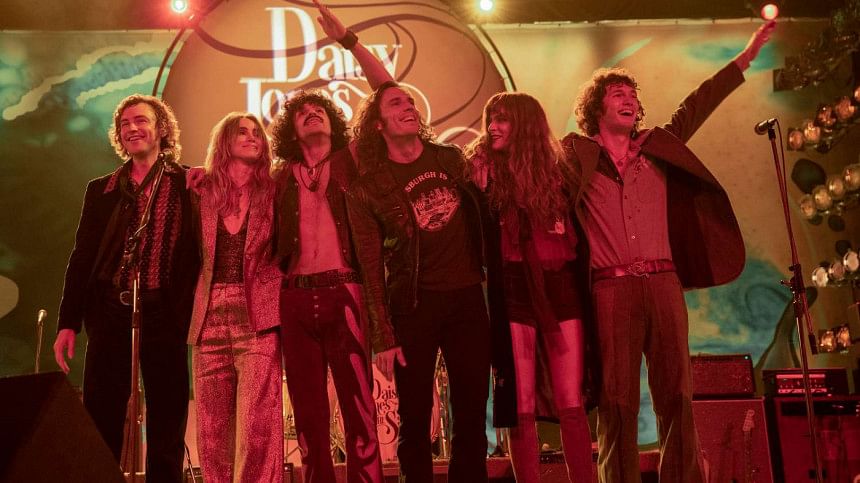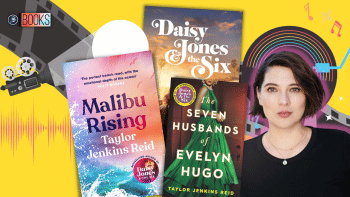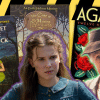‘Daisy Jones & the Six’ adaptation hits all the right notes

Taylor Jenkins Reid's best-selling novel, Daisy Jones & the Six (2019), tells the story of a fictional group of musicians who became an iconic rock band in the 1970s. Decades after the group's final gig, the tale is shared through the transcript of a series of interviews with band members, managers, and others involved in the rise and fall of The Six and their star female vocalist, Daisy Jones.
The book leaves readers wanting nothing more than to listen to Daisy Jones & The Six's sole album, Aurora. Enamored readers have tried. When you type in "Is Daisy Jones…" into Google, a prompt automatically pops up: "Is Daisy Jones & The Six a real band?"
On March 3, they became one. The book has been adapted into an Amazon Prime Video 10-episode limited series. The first three episodes are out now.
Reid has openly spoken about her inspiration and admiration of Fleetwood Mac, particularly Stevie Nicks and Lindsey Buckingham, and how her protagonists in their own ways are representatives of the '70s rock scene and the tumultuous romance that plagued Fleetwood Mac.
In her novel, Reid delves into the impact of infidelity on a marriage, the trappings of fame, and a man caught between his personal ambitions and his devotions to his family.
Her story is about addiction and the great loves of one's life. In the 70s, that was drugs for Daisy and it grew to include rockstar Billy Dunne, a man she knew she couldn't have because of his marriage to Camila and his commitment to his family. For Billy, it was and always had been Camila from the moment they met. But he had become more than infatuated with Daisy as they worked on music together.
At the forefront is Daisy's struggle with drugs, how they lit her up just as bright as her talent and brought her down as low as her insecurities and loneliness. She's a firecracker in the book, the kind of woman songs are written about but who'd rather be howling into a mic telling her own stories for others to listen to. Billy struggles with alcohol and drug addictions of his own, and vows to get better for his family. The show doesn't toss their addictions to the wayside, but it's less preoccupied with them.
Reid's story explores themes of art, creativity, and expression, particularly through collaboration. It looks at how personal relationships and behind-the-scenes drama shape iconic music, and what happens when artistic visions and personalities clash. The show unquestionably captures the fierce spirit and vibrant energy of the book, thanks in large part to Riley Keough and Sam Claflin's rich portrayals of Daisy and Billy respectively, and Daisy Jones & the Six's now real album Aurora, produced and co-written by Grammy Award-winning producer Blake Mills.
In particular, the granddaughter of the "King of Rock" Elvis Presley playing the lead role couldn't be more perfect. As Daisy, Keough has an undeniable magnetism. She takes a complicated, beloved character and more than does justice to the nuances of her at times frustrating personality. Keough and Claflin sing with their real voices on the show, and all the cast members play their own instruments. Although the words are changed, fans can finally listen to the novel's memorable songs, such as Regret Me and Look At Us Now (Honeycomb), which are entirely believable as hits.
The book takes us through closed corridors in achingly unnerving yet touching ways, requiring us to look beyond the words and towards the intentions. The "unreliable narrator" concept is clearly laid out—we readers are led to believe that the individual accounts of events, which cut back and forth between perspectives, are as the people involved choose to remember them, and not necessarily how things actually happened. It makes for an exhilarating journey through the band's ascent, but after a while, we long to get closer, to find out what the characters aren't confessing on the record, or zoom out to take in more of the '70s.
The streaming adaptation retains the flash-forward tell-all interview framing device through an on-screen documentary. Unsurprisingly, this format lends fertile ground to open interpretation of what really happened between the characters, with the showrunners taking creative liberties and reading between the lines in order to effectively portray the band's demise. However, the show barely bothers to age up its characters, which takes away considerably from the poignancy of seeing older, wiser souls reflect on the follies of their youth.
The series tries harder with Simone, a disco star in the making, who is the first character to see Daisy for who she is and love her for it. Simone has more air time in the show than she does in the book, allowing us glimpses into her own romance and career and offering the perspective of a queer Black woman in the '70s.
Meanwhile, Camila, the source of goodness and reason in the book, is given the freedom to be more vulnerable on screen. She is a photographer who has her own artistic ambitions. And despite her hard-headedness about Billy and her expectations for him to show up for her and their family, she has her own insecurities about marriage and motherhood. Might these insecurities soon translate to the blossoming relationship between Billy and Daisy?
Rocky, and plagued with melodrama much like the titular band itself, the show hits (almost) all the right notes of the book. By the end of episode 3, and the end of a transcendent studio performance between Billy and Daisy, we are all in. I will be seated to see how it all ends.
Shababa Iqbal is a Journalism graduate from Independent University, Bangladesh, who likes Jane Austen's novels and Disney movies. Email: [email protected].

 For all latest news, follow The Daily Star's Google News channel.
For all latest news, follow The Daily Star's Google News channel. 









Comments